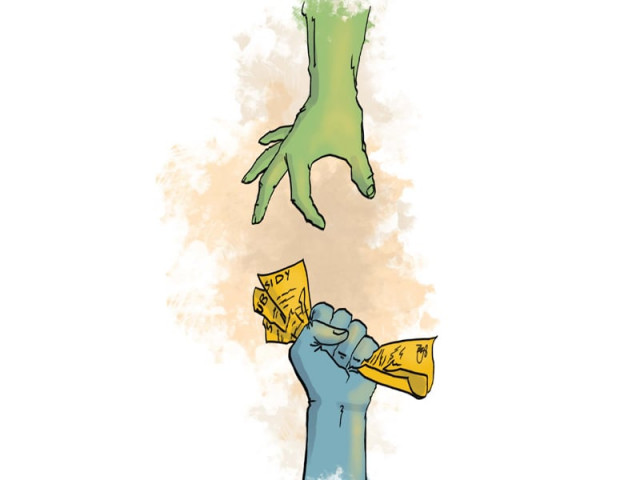ECC meeting: Committee rejects withdrawal of fertiliser subsidies
Decision likely to hit national exchequer hard after Rs12.3b paid in subsidies in 2010.

A division in the ranks of the highest economic decision-making authority, on the lines of reformists and agriculturalists, has stopped the government from withdrawing subsidies on sale of fertilisers – a facility largely restricted to influential landlords, which cost the kitty Rs12.3 billion last year.
After failing to take a clear line on Monday, the Economic Coordination Committee (ECC) of the cabinet, headed by the finance minister, formed a committee with a direction to submit a report in the next meeting. The Ministry of Industries and Production had sought ECC’s approval to increase imported urea prices by 100 per cent by withdrawing subsidies. The government provides an average Rs1,032 in subsidy on a 50-kilogramme urea bag sold at state-backed outlets.
Urea produced and sold by the private sector is almost 100 per cent more expensive than the fertiliser imported by the government. Urea imported through tenders cost the government Rs1,902 per 50 kg, which absorbed Rs932 and sold it at Rs970, showed the official summary. Against that, Saudi fertiliser’s landed cost is Rs2,102 per bag and the government sells it at Rs970, absorbing Rs1,132.
The government imported almost 800,000 tons of urea in 2010 and doled out Rs12.3 billion in subsidies. According to the commerce ministry, the 17 per cent sales tax recently slapped on sale of urea is also paid by the government from taxpayer money. The ministry has worked out a subsidy of Rs7.5 billion only for Rabi season requirements.
A National Assembly panel had recently raised concerns over beneficiaries of the imported subsidised urea, as common farmers have been purchasing urea at market prices. Secretary Commerce Zafar Mahmood had then put the responsibility on the shoulders of National Fertiliser Marketing Limited, which manages transport and sale of imported urea.
Export of surplus wheat
The committee allowed the Pakistan Agriculture Storage and Supplies Corporation to export 200,000 tons of wheat reserves on expectations of a bumper crop this year. The government has already allowed the provinces to export surplus wheat, as the central bank is pushing them to retire debt obtained to procure the commodity.
Savings scheme
ECC also stopped government institutions from investing in the National Savings Scheme.
The decision has been taken to encourage government departments to buy treasury bills, instead of commercial banks that are making millions of rupees in profit by exploiting government needs.
However, individual funds such as pension, gratuity, superannuation, contributory provident funds and trusts can still invest in the National Savings Schemes.
Members concerned over slow pace of implementation
ECC members on Monday expressed annoyance at the bureaucratic attitude towards decisions taken by the highest economic decision-making authority of the country. At least three ministers, including the finance minister, said decisions taken by ECC “are falling prey to the bureaucratic channel,” said an official who attended the meeting. The other two ministers were Makhdoom Shahabuddin and Hina Rabbani Khar.
“The finance minister, as chairman of the committee, observed the slow pace of implementation of ECC decisions and instructed concerned secretaries to accelerate it,” stated an official handout. The ministers also questioned bringing up every matter at the ECC forum, irrespective of whether it met the criteria of being raised at such a high level or not.
Published in The Express Tribune, April 12th, 2011.



















COMMENTS
Comments are moderated and generally will be posted if they are on-topic and not abusive.
For more information, please see our Comments FAQ